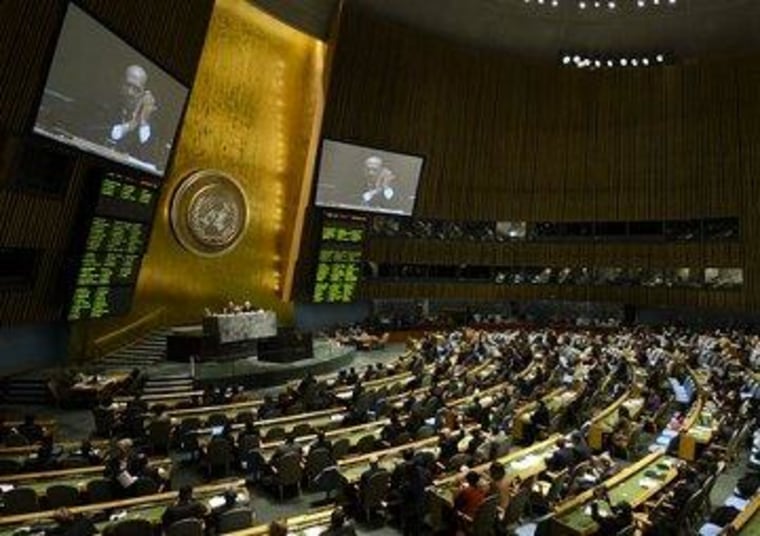The Arms Trade Treaty has been working its way through the United Nations, and at times, appeared to be struggling. But yesterday, with the support of the Obama administration, the ATT drew strong international backing.
The United Nations General Assembly voted overwhelmingly on Tuesday to approve a pioneering treaty aimed at regulating the enormous global trade in conventional weapons, for the first time linking sales to the human rights records of the buyers.Although implementation is years away and there is no specific enforcement mechanism, proponents say the treaty would for the first time force sellers to consider how their customers will use the weapons and to make that information public. The goal is to curb the sale of weapons that kill tens of thousands of people every year -- by, for example, making it harder for Russia to argue that its arms deals with Syria are legal under international law.
Following seven years of negotiations, the Arms Trade Treaty was approved by the U.N. General Assembly, 154 to 3, though there were many abstentions. The United States was part of the majority.
The ATT's purpose is not about consumer access to firearms or individual ownership of guns, but rather, setting controls on the international gun trade based on whether the weapons "will be used to break humanitarian law, foment genocide or war crimes, abet terrorism or organized crime or slaughter women and children."
As Secretary of State John Kerry explained, "It will help reduce the risk that international transfers of conventional arms will be used to carry out the world's worst crimes, including terrorism, genocide, crimes against humanity and war crimes."
So, which three countries opposed the treaty? Well, that's an interesting story.
There were 23 abstentions, including major powers like China and Russia, citing some ambiguities in its provisions. Then again, if the treaty goes into effect in a few years, even countries reluctant to ratify it will be affected as a new international norm takes shape.
That said, Iran, North Korea, and Syria -- arguably the nation's three largest pariah states -- took a stand against the Arms Trade Treaty.
What's interesting about that? At a certain level, nothing, given the expectations surrounding these three countries, but what I find noteworthy is that the National Rifle Association and Republican policymakers are taking the Iranian, North Korean, and Syrian side of the argument.
The NRA and other gun groups strongly opposed the treaty, capitalizing on conservative myths that it would infringe on Second Amendment rights by undermining the country's sovereignty. But the gun lobby's real opposition to the treaty is probably economics. The US is the world's leading arms exporter, and gun dealers aren't eager to be required to report weapons exports that may wind up in the hands of warlords or terrorists overseas.GOP senators like Rand Paul (Ky.) are still repeating the false claim that abiding by the treaty would lead to an international registry of American gun owners and "full-scale gun CONFISCATION." Conservatives have also argued that the treaty violates the Second Amendment by recognizing the rights of governments, but not their citizens, to self-defense, even though it has no international policing mechanism and explicitly recognizes the "inherent right of all States to individual or collective self-defense."
The ATT will go to the Senate where it will almost certainly fail in the face of overwhelming Republican opposition. The treaty would need 67 votes for ratification, and given a recent non-binding vote on an ATT resolution, it will struggle to get 50 votes.
The U.S. has, I believe, entered a post-treaty phase of international diplomacy.
